LisbonLisboaPortugal.com
The best independent guide to Lisbon
LisbonLisboaPortugal.com
The best independent guide to Lisbon
Lisbon day trips; the best locations to visit in 2026
With my 26 years' experience of advising visitors on Lisbon, one of the most common mistakes I see is visitors confining their trip to the city limits. To do so misses out on the rich diversity of central Portugal, where historic towns, royal palaces, and dramatic coastlines lie just a short journey from the capital.
Within an hour of Lisbon, you can be exploring the colourful palaces of Sintra, relaxing in the coastal town of Cascais, or watching powerful Atlantic waves roll onto the vast beaches of the Costa da Caparica. For a more traditional Portuguese experience, away from the coach tours, is the port city of Setúbal or the peaceful fishing town of Sesimbra, both set amidst the hills of the Serra da Arrábida. To deeper appreciate Portugal’s varied history, there are the magnificent palaces at Mafra and Queluz.
A slightly longer journey reveals even more of Portugal, from the ancient Roman city of Évora to the walled town of Óbidos and the world-class surf of Ericeira or Peniche.
With so many options, the main challenge for visitors is not finding a place to go, but choosing the right destination for your interests. I have written this guide based on my personal experience, so you can find the perfect day trip and get the most from your time in the Lisbon region.
A summary of the most popular day trips from Lisbon
Towns near Lisbon (within 50km)
These are the best day trips which I consider easy to visit from Lisbon. They can all be easily reached from Lisbon via public transport or Uber/Bolt. I've listed them in my suggested order of priority.
Sintra (train 30km from Lisbon) - A delightful town filled with opulent palaces and luxurious villas extending over the cooling hills of the Serra de Sintra. Sintra is the most popular day trip from Lisbon, with millions of visitors each year flocking to see the beautiful Pena Palace or the mysterious gardens of the Quinta da Regaleira. There is so much to see you could easily spend two days in Sintra. A day trip to Sintra.
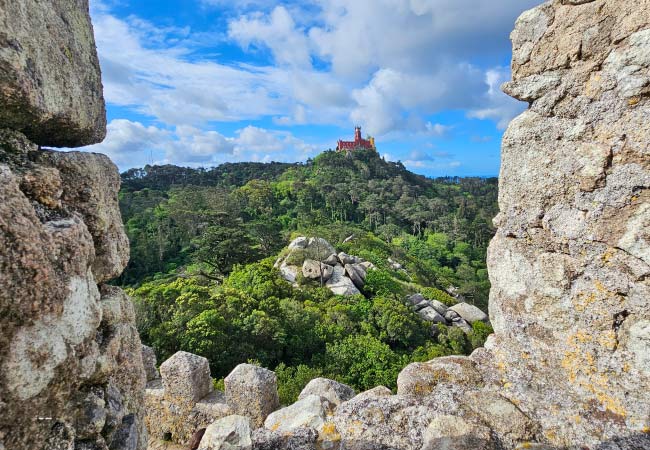
The view from the Moorish Castle over the hills of Sintra to the Palácio da Pena
Cascais (train 40km from Lisbon) - A charming coastal town that blends fishing heritage with grand 19th-century architecture and beautiful beaches. Once the summer retreat for Portuguese nobility, Cascais now offers impressive villas, museums, and proximity to natural wonders like Cabo da Roca, the westernmost point of mainland Europe. A day trip to Cascais.
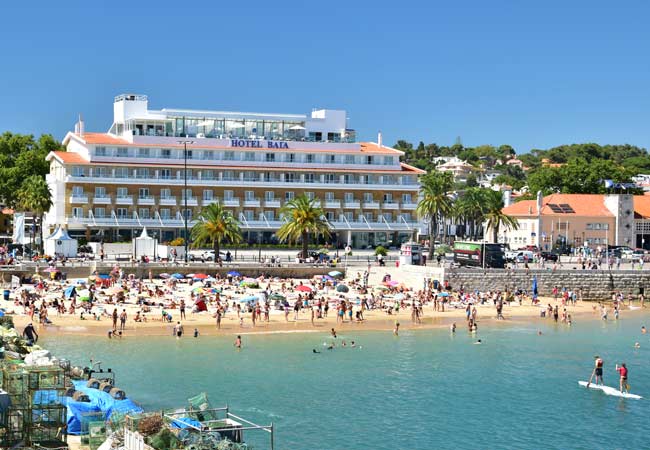
Setúbal (train 50km from Lisbon) - An authentic port city with a attractive old town, bustling fish market, and beautiful waterfront along the Sado Estuary. From here, you can take a ferry to the stunning beaches of the Troia Peninsula or try to spot the resident bottlenose dolphins. A guide to Setubal.
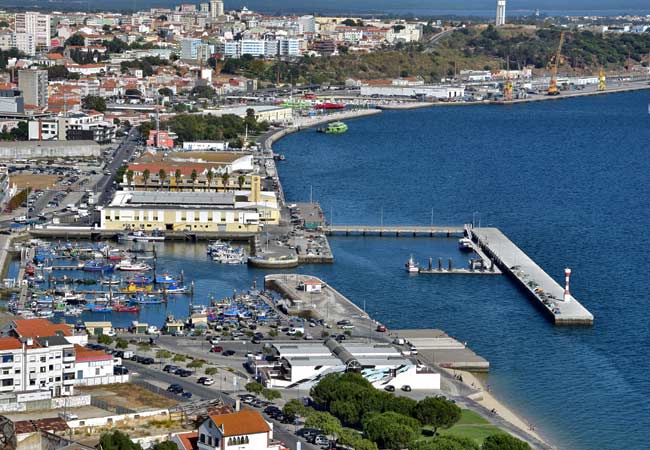
Sesimbra (bus 40km from Lisbon) - A favourite holiday spot for Portuguese locals with an outstanding beach and excellent seafood restaurants. The surrounding area offers dramatic coastal scenery at Cabo Espichel and the beautiful Serra da Arrábida natural park with its secluded beaches and forested hills. Guide to Sesimbra.
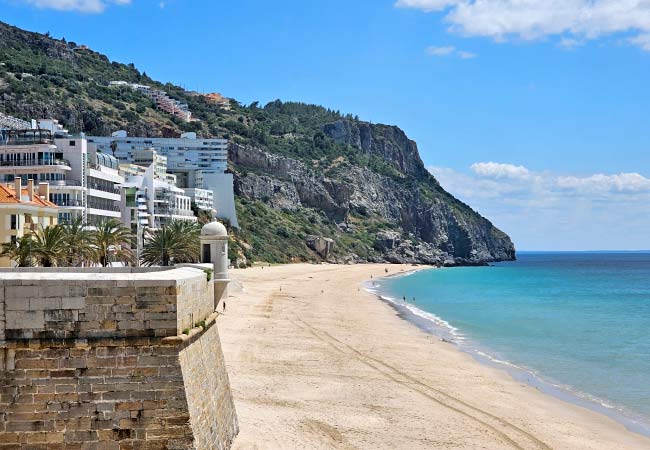
Azeitão (bus 30km from Lisbon) - The charming heart of Setúbal's wine region where visitors can taste exceptional local wines at historic estates like Bacalhôa or José Maria Da Fonseca. Azeitão is often visited on the way to Sesimbra.
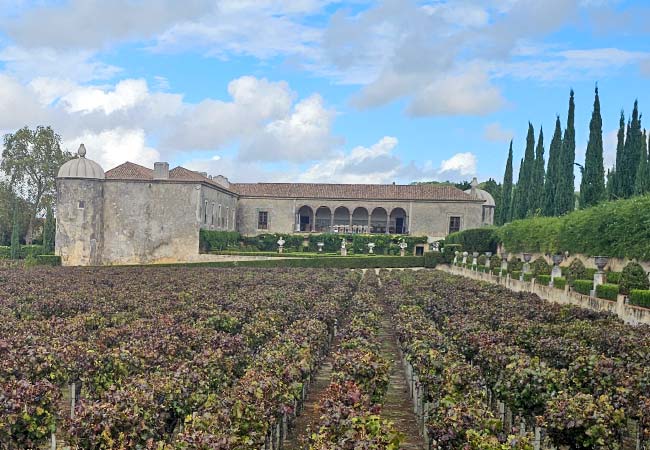
Cristo Rei (ferry/bus 5km from Lisbon) - A towering statue of Christ which provides spectacular views of Lisbon and the 25 de Abril Bridge. Cristo Rei, Cacilhas and Costa da Caparica are often combined in a single day trip.
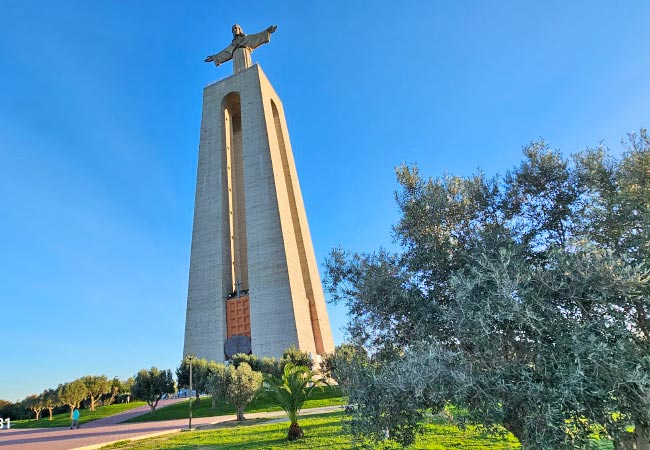
Mafra (bus 40km from Lisbon) - Home to Portugal's largest palace, the Palácio Nacional de Mafra, an enormous 18th-century complex with 1,200 rooms that exemplifies the extravagance of Portugal's golden age. A trip to Mafra is often combined with Ericeira. Guide to Mafra.
Costa da Caparica (bus 20km from Lisbon) - A modern beach resort backed by an impressive 30km stretch of golden sand that is famed for its surfing waves. Costa da Caparica is a lively alternative to the beaches along the Cascais coastline. Guide to Costa da Caparica.
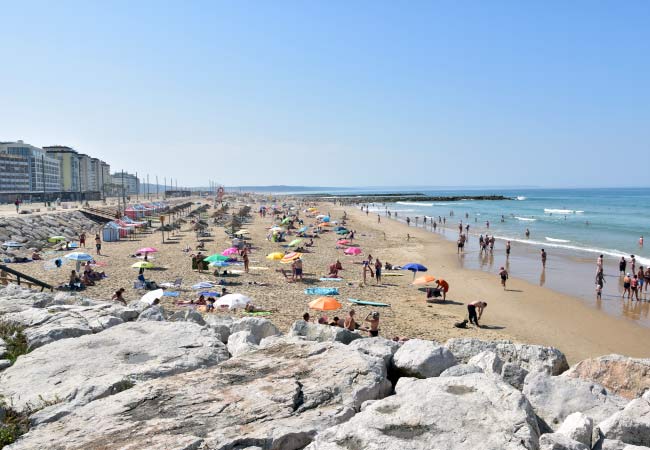
Cacilhas (ferry 10min from Lisbon) - A characterful riverside district in Almada directly across the Tejo estuary from Lisbon. Popular for its excellent seafood restaurants and historic shipyard, it also serves as a starting point for visits to Cristo Rei and Costa da Caparica.
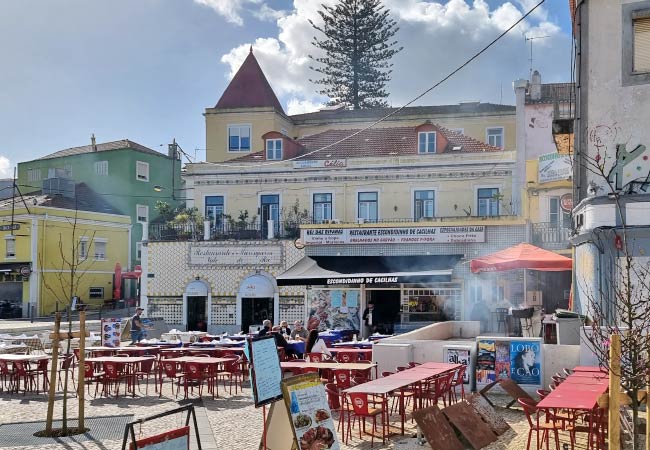
Destinations that are further from Lisbon (over 50km)
These towns require longer travel times from Lisbon and are generally more convenient to visit by car, though public transport options are available.
Evora (train 130km from Lisbon) – The historic capital of the Alentejo region, packed with monuments including a Roman temple, medieval cathedral, and the macabre Chapel of Bones. Evora is slightly further from Lisbon, but its traditional charm and peaceful Alentejo atmosphere make the trip worthwhile - a day trip to Evora.
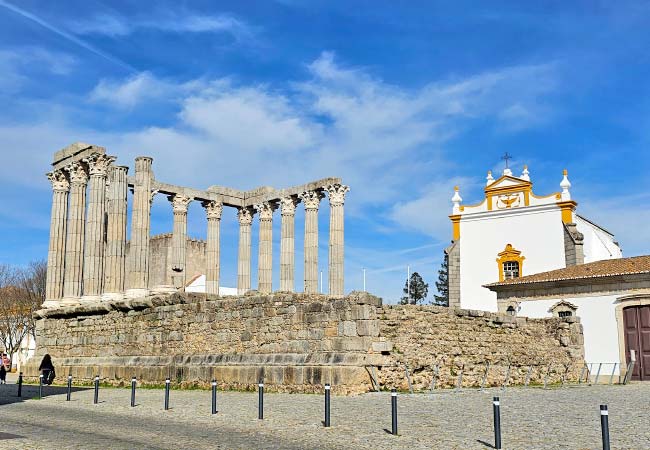
The Roman temple and cathedral of Evora
Óbidos (bus 85km from Lisbon) – A picturesque medieval walled town that was traditionally gifted to Portuguese queens. Found within the city walls are cobbled streets, an ancient castle, and shops selling Ginja, a sweet cherry liqueur. Óbidos is delightful but small, and can be fully seen in 2 hours - Obidos guide.
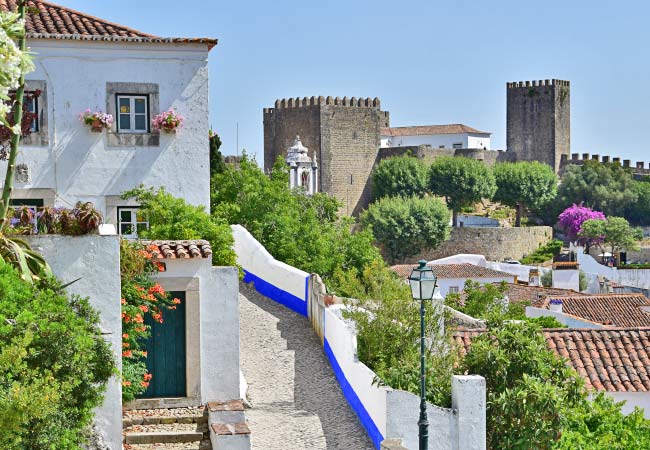
Tomar (train 140km from Lisbon) – A peaceful town dominated by the impressive Convento de Cristo, a fortress-monastery that was once the headquarters of the Knights Templar. Tomar is often overlooked by many visitors and the town feels much less touristy than many other places listed here - Tomar guide.
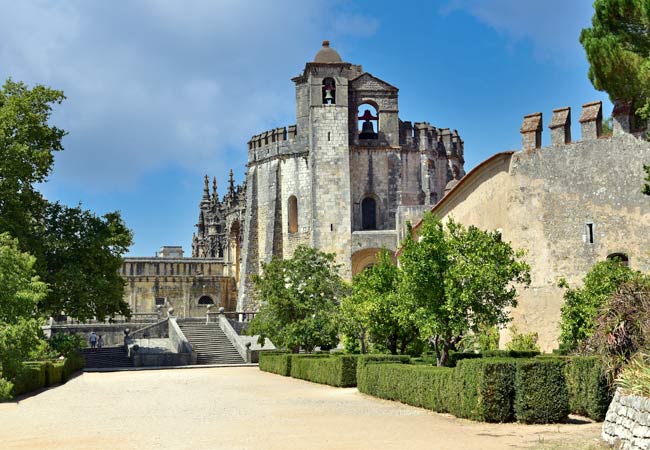
Ericeira (bus 50km from Lisbon) – A picturesque fishing village turned surfing hotspot with whitewashed buildings perched on cliffs above the Atlantic. The town blends traditional Portuguese character with a laid-back surf culture, offering excellent seafood restaurants, cobbled streets, and access to some of Europe's best surfing beaches - Ericeira guide.
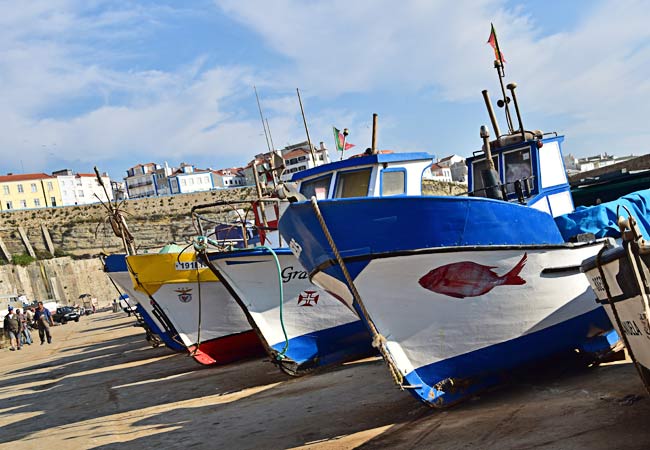
Nazaré (bus 120km from Lisbon) – A traditional beach town famous for its enormous winter waves that attract daredevil surfers. The town combines a beautiful sandy beaches with the historic Sitio district perched on the cliff above, accessible by funicular - Nazaré guide.
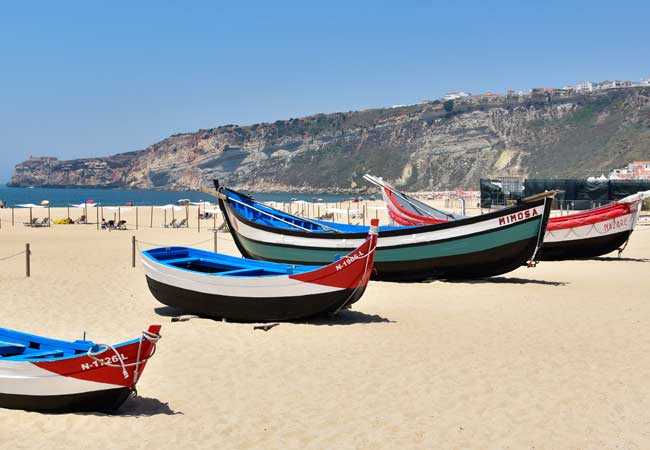
Coimbra (train 200km from Lisbon) – Portugal's former medieval capital and oldest university city set above the Mondego River. The spectacular University dominates the hilltop, while below lies a city rich with student traditions. Despite the distance, Coimbra is accessible as a day trip via high-speed train - Coimbra guide.
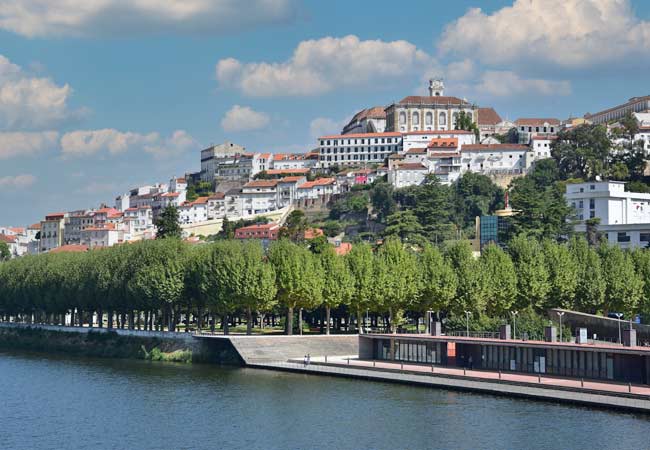
Fátima (bus 130km from Lisbon) – Portugal's most important religious site where three shepherd children had multiple apparitions of the Virgin Mary in 1917. Each year, millions of pilgrims visit the vast sanctuary complex with its basilicas and Chapel of Apparitions built at the exact spot of the visions.
The interactive map below shows the location of each of the day trips (Note: zoom in or out to see all of the points)
Legend: 1) Sintra 2) Cascais 3) Setubal 4) Sesimbra 5) Ericeira 6) Azeitão 7) Mafra 8) Cristo Rei 9) Costa da Caparica 10) Cacilhas 11) Evora 12) Óbidos 13) Tomar 14) Nazaré 15) Coimbra 16) Fátima
How about a small group tour?
One of the best ways to discover the Lisbon region is to join a guided tour. We have worked with Getyourguide.com for the last six years, and some of the best tours of Lisbon include:
The following section provides a summary of each destination, why you should visit it and links to further in-depth information.
Related articles: Best driving routes of Lisbon
Sintra - the best day trip from Lisbon
Why? Whimsical palaces and opulent villas all set in the hills of the Serra de Sintra
Highlight: Palácio Nacional da Pena, Quinta da Regaleira, Palácio Nacional de Sintra
How to travel there: Train, 30 minutes
Typical visit length: 7 hours (there are enough sights for 2 days of sightseeing)
Tourism level in the peak season: Incredibly crowded
Sintra is a picturesque town set within the cooling hills of the Serra de Sintra. This region was long favoured by Portuguese nobility, and as you wander through the town you will discover grand palaces, ruined castles and lavish 19th-century mansions.
The standout attraction is the beautiful Palácio Nacional da Pena, with its vivid yellow and red towers rising from the lush green forests that surround it. Other popular sights include the gothic Palácio Nacional de Sintra in the town centre, and the Quinta da Regaleira, where hidden pathways wind beneath the ornate gardens.
There is so much to see in Sintra that a second day is well worth considering if you have the time. This would allow you to explore the ruins of the Moorish castle, the romantic Monserrate Palace, the elegant Palácio de Seteais, and the scenic hill trails around the Vila Sassetti.
Personal opinion: I’ve watched Sintra transform an undiscovered gem in 2001 to a much-hyped destination that struggles with tourism. Its sights, and the variety of them are unmatched in Portugal but the excessive tourism detracts so much from any trip. There is no longer any spur of the moment heading to the Pena Palace, tickets must be bought well in advance during the summer, and I’ve given up trying to have lunch in the town, due to queues, rushed service and inflated prices (I head to a café for a quick snack or bring food from Lisbon). I also don’t think I have had a good ride on the 434 up to the Pena palace in the last 5 years.
All that said, Sintra is magical and can't be missed, so do go, but pre-book tickets and head there early in the day.
Related articles: Introduction to Sintra - A day trip to Sintra - Lisbon to Sintra – The Pena Palace
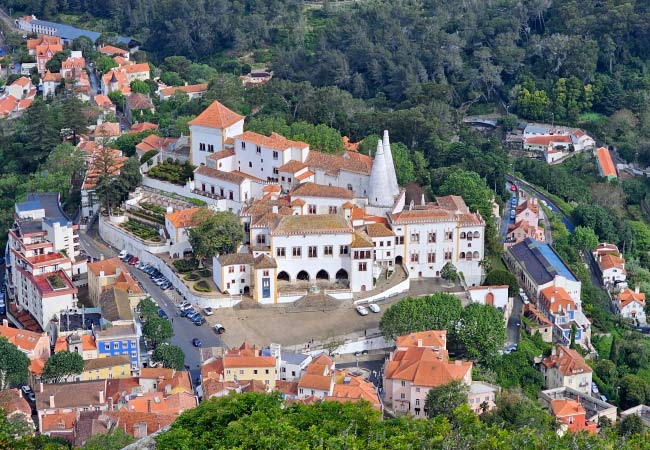
The Palácio Nacional de Sintra, with its two distinctive chimneys
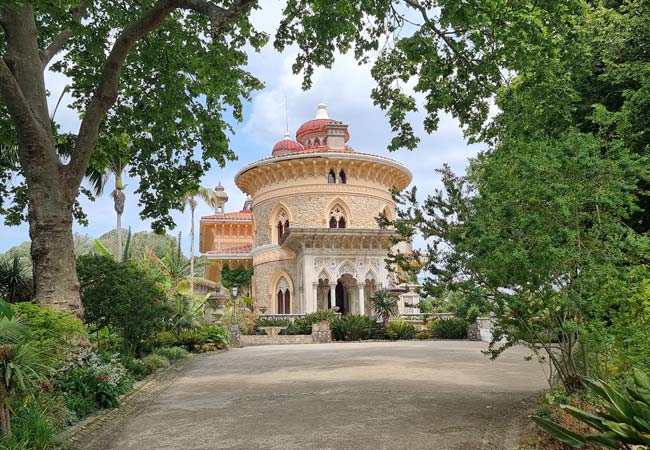
The Palácio de Monserrate
Cascais - the best beach town day trip from Lisbon
Why? The Lisbon coastline's premier resort town
Highlight: Guimarães villa, Cabo da Roca, Cascais fort and beaches
How to travel there: Train, 40 minutes
Typical visit length: 5 hours
Tourism level in the peak season: Busy
Cascais has long served as the summer retreat for Portuguese nobility, and today it remains the premier beach town along the Lisbon coastline.
The town elegantly combines its fishing heritage, grand 19th-century architecture and glorious beaches to create a wonderful holiday destination. Cascais is equally well suited to a day trip, offering grand villas, carefully maintained parks and a selection of fascinating museums for you to explore.
To the north of Cascais, you will find the Boca do Inferno cliff formation and Cabo da Roca, the most westerly point of mainland Europe. During the summer months, a vibrant holiday atmosphere fills the town, while an extensive selection of bars and restaurants provides a buzzing nightlife scene.
Personal Opinion: There is nowhere nicer close to Lisbon on a sunny day. Come to relax on the pretty beaches, Praia da Rainha is my favourite, get an ice cream and wander the promenade to Estoril or if the sun is too hot head to the shade of the Parque Marechal Carmona. Outside of the summer it is a great place to hire a bike and cycle the coast towards Guincho Beach, or if feeling adventurous all the way back to Lisbon. Cascais is ideal for a day trip with sights, charm and glorious beaches, I love it and think it beats most coastal towns in the Algarve.
Related articles: Cascais guide - Day trip to Cascais - Cabo da Roca
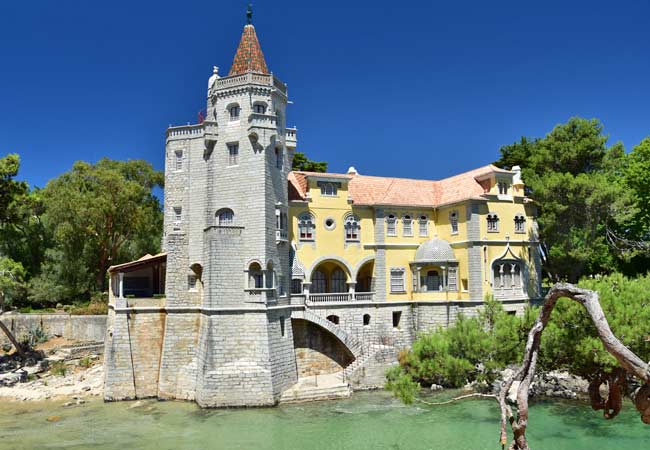
Setubal
Why? Real Portugal, away from the tourists
Highlight: Fortress São Filipe, Mercado do Livramento Península de Troia
How to travel there: Train (30 minutes)
Typical visit length: 4 hours + 2 hours for Troia
Lots of tourists in the summer? Few foreign tourists
Setúbal is a major port and industrial town, but it offers a surprising amount to see and do for a day trip. At the centre of Setúbal lies a charming old town, while the pretty waterfront opens out onto the Sado Estuary. This busy waterway looks across to the Tróia Peninsula and is home to a resident pod of bottlenose dolphins.
The main sights of Setúbal include the Mercado do Livramento, widely regarded as the best fish market in Portugal, and the Fortaleza de São Filipe, which stands high above the city. For your day trip, you can catch the ferry across to the Tróia Peninsula and spend time on the region's beautiful beaches.
Setúbal is not one of the more common day trips from Lisbon, but it is a wonderful place to experience modern, authentic Portugal.
Personal Opinion: I find convincing people to go to Setubal difficult, as tourist literature and influencers skip it, and it has no real standout attraction, apart from the delicious Choco frito (fried cuttlefish). For the right person Setubal is great, it's got a gritty real Portuguese feel, so different to all of the other tourist towns of this guide. When combined with the Serra da Arrábida it makes the perfect non-touristy day trip.
Related articles: Setubal guide
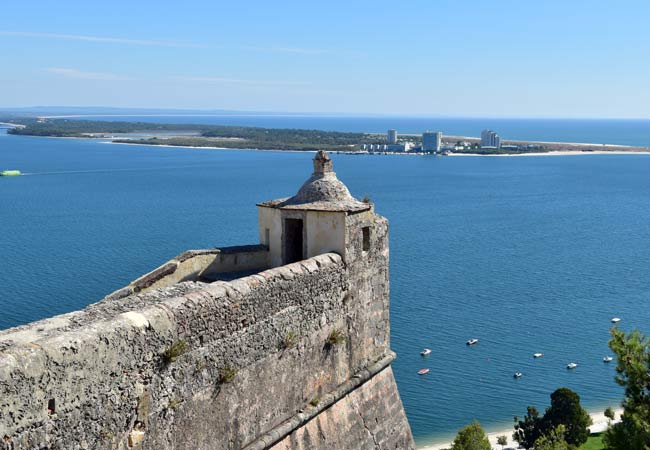
The waterfront of Setubal, with the São Filipe fort at the top of the hill
Obidos
Why? The quintessential Portuguese walled town
Highlight: City walls, charming side streets
How to travel there: Bus (40 minutes)
Typical visit length: 2 hours
Tourism level in the peak season: Very busy between 10am-3pm with coach tours
Obidos is one of Portugal’s most picturesque towns. The town was given to Queen Urraca in 1210 as a wedding gift and, up until the fall of the monarchy in 1910, Obidos was owned by the Queen of Portugal.
There could not have been a more delightful town to be a patron of, with its traditional painted houses lining the cobbled streets, leading up to the medieval castle. Obidos may be small, but every single street is delightful.
Obidos does get very busy with coach tours but it is easy to leave the main streets, and wander the quiet side streets or ancient city walls. While in Obidos, don’t miss having a drink of Ginja - a sweet alcoholic drink served in a chocolate cup.
Personal Opinion: Óbidos is as charming as the pictures show but you must realise that it is only a small town and can be fully seen within 2 hours, while organised tours spend even less time here, typically just an hour. Don't be the disappointed visitors travelling 60 minutes by bus or car to see Óbidos in a rush and head back, always have a second destination to combine with Óbidos. I personally like the beach side town of Foz do Arelho and the Óbidos Lagoon, or for something more unique, Buddha Eden, Europe's largest collection of Buddha statues.
Related articles: Obidos guide - Lisbon to Obidos

The town is completely encircled by the town walls, which can be walked
Evora day trip
Why? Historic capital of the Alentejo region, many historic buildings
Highlight: Roman Temple, Bone Chapel and Gothic Cathedral
How to travel there: Train (1 hour)
Typical visit length: 5 hours
Lots of tourists in the summer? Moderately busy
Évora lies at the heart of the Alentejo, a region of rolling plains and olive groves that swelters under the intense summer sun. The city has an extensive history, having served as an important Roman trading town, a defensive stronghold for the Moors and a major religious centre during the 13th and 14th centuries.
This varied past has left behind an assortment of fascinating attractions, including a Roman temple, an impressive aqueduct and a rather unsettling bone chapel. There is a great deal to see in Évora, and the city holds the second-highest number of national monuments in Portugal, surpassed only by Lisbon.
The train or bus journey to and from Évora is quite lengthy, so you may wish to spend a night here rather than making a rushed day trip.
Personal Opinion: I love Evora, and personally think it is better than Sintra, apart from the distance from Lisbon and the summertime heat. There is simply so much to see, the pace is less hectic, restaurants are better quality and even the souvenir shops sell craft items instead of mass produced tat. Do not skip Sintra for Evora, but if you have a longer stay seriously consider Evora.
Related articles: Evora guide – Lisbon to Evora
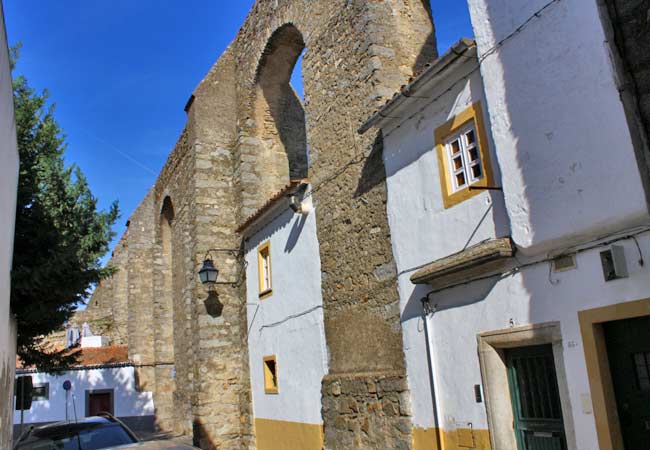
The historic centre of Evora is incredibly pretty, here houses and shops have been constructed below the arches of the aqueduct

The Roman temple and cathedral of Evora
Sesimbra day trip
Why? Where the Portuguese go on holiday
Highlight: Cabo Espichel, Castelo de Sesimbra, Parque Natural da Arrábida (car needed)
How to travel there: bus 40min
Typical visit length: 3 hours (with car 6 hours)
Lots of tourists in the summer? yes
Sesimbra is a favourite holiday destination with the Portuguese. The town may not have a vast number of tourist attractions, but the authentic Portuguese atmosphere, beautiful beach and outstanding fish restaurants make it an enjoyable day trip from Lisbon.
To get the most from the Sesimbra region a rental car is needed, and this could add the Serra da Arrabida and the Cabo Espichel to the day trip. The Cabo Espichel is the wind-blasted south-westerly headland formed of massive cliffs and raging seas. Found at the headland is a historic church, a powerful lighthouse and dinosaur footprints that have been exposed in the cliffs.
The Serra da Arrabida are a series of forest hills and a wonderful coastline that offers some of the most beautiful beaches in Portugal. A highlight of the Serra da Arrabida is the N379 road, which meanders through the hills and crosses a ridge, providing spectacular views both north and south.
Related articles: Sesimbra guide – The Cabo Espichel - The Serra da Arrabida
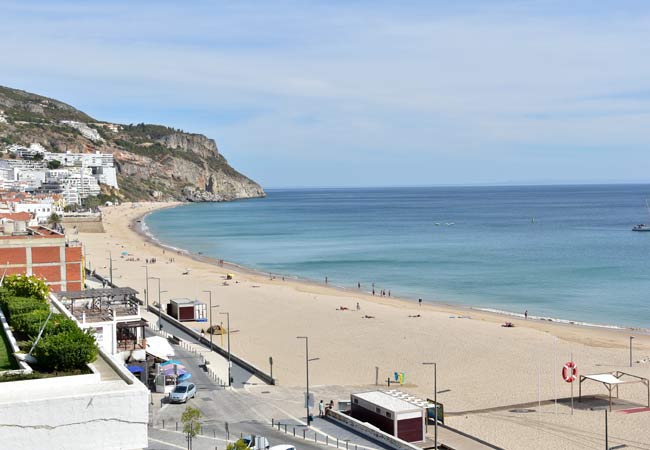
The pretty beach front of Sesimbra, surrounded by the hills of the Serra da Arrabida
6 - Nazaré
Why? Traditional beach town, famed for its winter waves
Highlight: Praia do Norte surfing area, Sitio district, beach
How to travel there: bus 60min
Typical visit length: 4 hours
Lots of tourists in the summer? Yes, but not over crowed
Nazaré is a delightful beach town which exudes Portuguese charm. The town is set along one of the finest beaches of central Portugal, and the beachfront is lined with traditional beach cafes, shops and hotels.
High above the town is the historic Sitio district, which leads down to the fort and the famed Praia do Norte surfing beach. During the winter, massive waves (up to 30m) are formed off the Sitio headland and daredevil surfers attempt to surf these colossal waves.
Our opinion: Nazaré is a pleasant location for a day trip which combines both an outstanding beach and an enjoyable town.
Related articles: Nazaré introduction
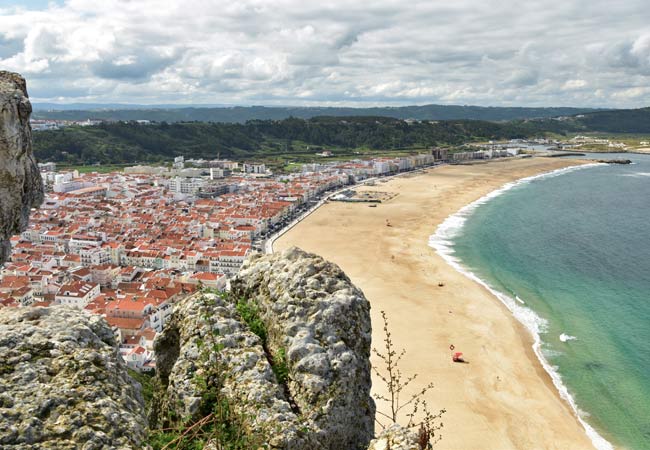
The view from the Sitio headland over Nazaré's beach
8 - Tomar
Why? Religious centre for the Knights Templar
Highlight: Convento de Cristo
How to travel there: train
Typical visit length: 4 hours
Lots of tourists in the summer? no
Today, Tomar may be a peaceful town, but during the 13th century, it was one of the most influential locations of the Iberian Peninsula, being the stronghold of the Knights Templar (later referred to as the Order of Christ). This powerful and secretive order ruled from the Convento de Cristo, an impressive fortified religious complex, with the beautiful Charola church at its centre.
The Convento de Cristo is often regarded as one of the finest national monuments of Portugal.
The town of Tomar is relaxed and pretty, with cobbled streets, ancient churches and an unhurried atmosphere in the cafes and restaurants that line the Nabão River. If you are seeking a non-touristy day trip, then Tomar is the place for you.
Related articles: Tomar guide

The Charola at the centre of the Convento de Cristo
9 - Mafra and Ericeira as a day trip from Lisbon
Why? The setting for the largest palace in Portugal
Highlight: Mafra palace, the surfing vibe of Ericeira
How to travel there: bus
Typical visit length: 2 hours (often a day trip is combined with Ericeira)
Lots of tourists in the summer? not too crowded
The Palácio Nacional de Mafra is the largest palace in Portugal. The scale of the building completely dominates the town, and its 18th-century construction almost bankrupted the Portuguese by employing a staggering 45,000 workers. This vast complex contains over 1,200 rooms and even today with the limited number open, visitors will still find themselves walking long distances.
A day trip to Mafra is often combined with Ericeira, as apart from the palace there is not much else to see in the Mafra.
Ericeira is a traditional fishing town, which is at the centre of a coastline of fantastic surfing beaches. This has transformed peaceful Ericeira into a cool surfing hub, where historic buildings sit next to trendy surfing bars. Ericeira is extremely pretty, with its cobbled streets and whitewashed houses perched at the top of sheer cliffs.
Related articles: Mafra guide - Ericeira guide
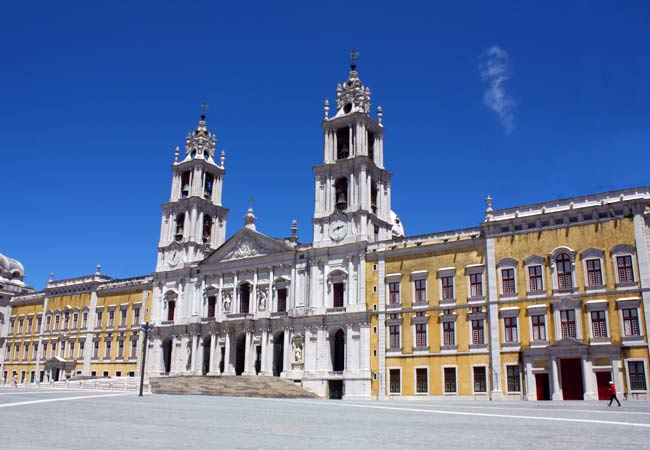
A Basilica lies at the centre of the palace, and the front façade is 220m long

Ericeira maybe a trendy surfing destination but it is still a fishing town at heart
10 - Cristo Rei statue and Costa da Caparica
Why? The Cristo Rei viewpoint and the beautiful beaches of the Costa da Caparica
Highlight: The Cristo Rei viewpoint
How to travel there: Cristo Rei ferry (15min) Costa da Caparica (20min)
Typical visit length: 1 hour Cristo Rei and 2 hours Costa da Caparica
Lots of tourists in the summer? yes
An excursion to the Christ Rei statue and the town of Cacilhas is an enjoyable half-day activity (including travel time), which can be extended into a full day by visiting the resort town of Costa da Caparica.
The Christ Rei statue stands on the southern bank of the Tejo Estuary, and from the viewing platform are wonderful views of the region. Costa da Caparica is a modern beach resort that is situated on a beautiful sandy shoreline, which extends for 30km along the entire western side of the Setubal Peninsula. During the summer a mini-train travels along the coastline and provides access to deserted beaches.
Tourist advice: The best way to travel to the Christ Rei statue is to catch the ferry from Cais do Sodré to Cacilhas, and then take the 3001 bus service from Cacilhas to the statue.
Related articles: Travel to Cristo Rei - Costa da Caparica guide
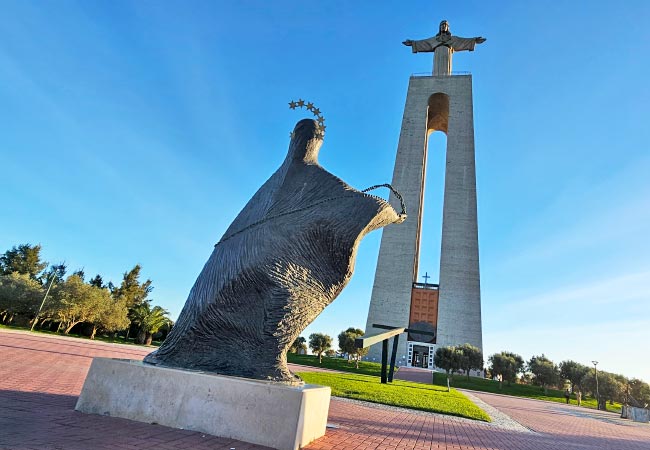
The Cristo Rei statue stands on the southern banks of the Tejo estuary
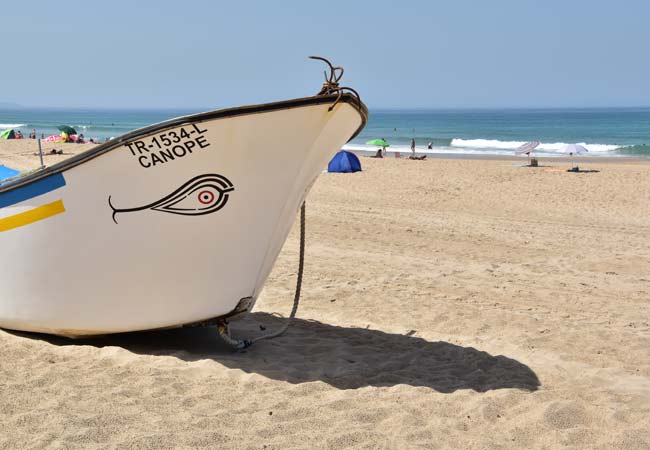
There are beautiful and deserted beaches to the south of the Costa da Caparica coastline
Ideas with a rental car
Areas near Lisbon where a rental car is needed to explore
1) Serra da Arrabida Natural Park, 2) Serra de Sintra and Coastline 3) Palmela and vineyards of Azeitão 4) Evora and Alentejo
Warning: Never drive to Sintra, as there is limited carparking and narrow roads
Discover more of Lisbon with our most popular guides
Expert Insight: These guides are curated by Philip Giddings, a travel writer with over 25 years of local experience in Portugal. Since 2008, Phil has focused on providing verified, on-the-ground advice for the Lisbon region, supported by deep cultural ties through his Portuguese family. Read the full story here.
If you've found our content valuable, we'd welcome your support.
The digital publishing landscape has evolved significantly. As a small independent publisher, we face growing challenges. Search engines increasingly favour paid content over organic results, while AI-generated content often reproduces original work without attribution.
To support our work, please consider bookmarking this page (press Ctrl + D) for quick access. If you find an article helpful, we'd be grateful if you'd share it with friends on social media.
For specific questions, please see our Reddit community at r/LisbonPortugalTravel.
Should you notice any outdated or incorrect information, please contact us at [email protected]
Thank you for helping us continue to provide valuable content in an increasingly challenging digital environment.



































